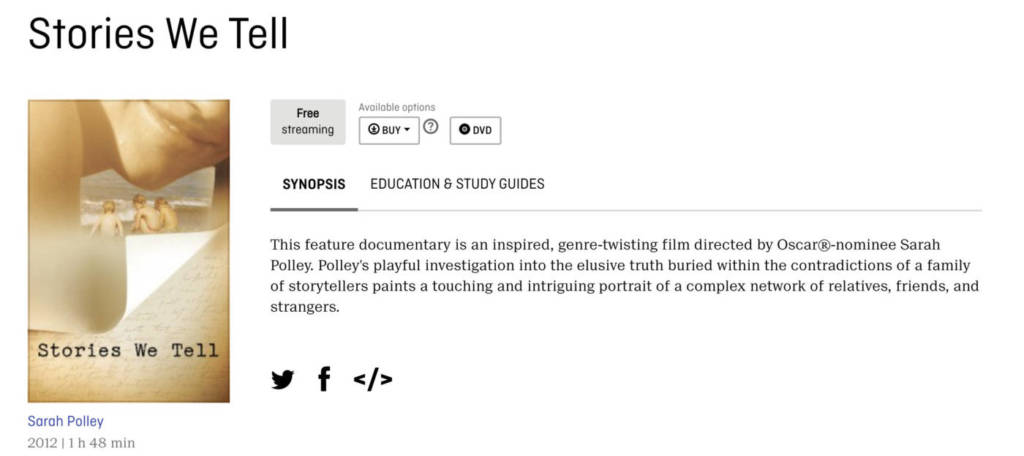Monday:
Critique of Parents Video
Wednesday:
Critique of Parents Video
Time to revise and improve videos, update blog descriptions
Visit to AGG
Monday:
Critique of Parents Video
Critique of Parents Video
Time to revise and improve videos, update blog descriptions
Visit to AGG
Critique of Parents Videos
Complete critique of Parents Videos
Revise and post videos with description on the blog
Visit to the AGG
2. Film: Sarah Polley, The Stories We Tell
https://www-nfb-ca.subzero.lib.uoguelph.ca/film/stories_we_tell/?ctlgsrc=mr

Videos may be up to 10 minutes MAX. They may include original and/or found footage.
Ideas and work in progress must be discussed in class before critiques. See schedule for details.
Consider your parents. You may choose to work with one or many of the individuals that are your parents.
*This does not have to literally be your mother or father – you may work with the idea of parents, with remembered parents, with other people’s parents, with dream parents. Interpret this theme as widely as needed. You may also be a parent – and want to explore what the role means to you – and work with your children. It’s up to you.
Who are your parents? What are the quirks that distinguish them? What is your relationship with them like? What are their relationships like with others? What are they into? Who were they in the past vs. the present? What are their strengths and their weaknesses? Do they understand what you do? Do you understand what they do? Think about what you want to discover, or bring out about your parents, and/or your relationships. Think about something really unlikely for your parents to do. How do the attributes and concerns about your parents reflect truths about you or your family, or about a wider world?
You may consider*:
Interviews
Voice-overs
Using still photographs
Truth vs Fiction
Documentary style observation
Use of sound/music/dancing
Taking your parents by surprise
Instructions for parents to perform
Task for you to perform with your parents
Performances by non-actors
Working remotely with parents
Absence of parents
Past vs. Present
Using found video/film/audio
Artists:
Michelle Pearson Clarke
Basil Alizeri
Janine Antoni
Gillian Wearing
Jim Verburg
Lyla Rye
Evergon
Sarah Polley
Patty Chang
Aleesa Cohene
Steve Reinke
Aislinn Thomas
Mona Hatoum
Lee Walton
Rajnar Kartansson
Adad Hannah
Sheilagh Restack
Lenka Clayton
*Reminder: Always create works that are safe and respectful for you and others at all times. Discuss your ideas with the instructor.
Reminder: Field Trip on Wednesday! See you in Toronto!
Critique for Post-Internet Video Art
All blog posts – including titles, finished video, notes and description – are due on the blog one week after critiques.
*Remember to pay for the bus trip to Toronto! Go to the eventbrite link in your email.
Discussion of video proposals
Work time in class – video editing tips and tricks
Workout videos: The Joy Workout
Using a mix of found footage (video and or sound) from YouTube or other social media video channels, create an original work of video art that responds to aspects of contemporary video culture, intended for gallery exhibition. Videos may be up to 10 minutes MAX.
Videos will be made in groups of two (or solo).
PART ONE: Research presentation and discussion
Forage through the internet for the tropes of popular video culture you would like to explore more deeply. We’ll discuss possible options in class, so a pair of students can each present a video genre. The presentation should take up to 10 minutes MAXIMUM including video time.
Prepare a presentation on your blog page – of one or two examples of internet videos.
Give a general description of your videos/video genre they are representative of. Consider these questions and others relevant to your selction:
PART TWO: Show proposed samples/work in progress for discussion
Together with a partner – prepare some samples of footage and approaches for a final piece to discuss with the class.
Consider some of these questions:
How does your video document a historical moment – in internet culture, and in the wider world?
How does what you want to do amplify, deconstruct, or subvert what is already happening on the internet?
How is what you are doing something new?
What is the kind of experience you want to create for viewers/users?
What is the ideal way for the video to be presented?
What are some of the technologies, software, or technical experiments and gimmicks you may need to achieve? Do you want to use avatars? Live stream? Rip music and video from YouTube? Prepare your ambitious technical goals for Nathan, and we can design demos to support your ideas.
PART THREE: Present your final work for critique – see schedule for details.
Introductions
Syllabus
Tour of lab and equipment
Class blog – invites, demo post
Lecture: TEXT Instructions for the world
Assign: Using Text as Art – Present one artist for discussion on Wednesday.
Present artists who use text (5 minutes each!)
Explore reading: Dirty Words: Tammer-El-Sheikh, from Canadian Art
Assign Banner exercise – due for discussion on blog on Monday next week.
Explore the reading, Dirty Words by Tammer El Sheik from Canadian Art. Read for meaning, and read like an artist looking for text as material for a new work.
You will excerpt a fragment of text – in order – to create a banner, and hang it in a context that will expand/alter/transform its meaning.
Document your banner, and post an image of it with a project description on your blog page.
Consider how artists use conceptual strategies to use text in public/context-specific sites:
We will have some time in class to discuss options and use printing facillitites and materials.
Consider fonts, design, scale, and colours for your final banner.
*BANNERS DUE FOR DISCUSSION ON MONDAY NEXT WEEK! Post on your blog page.
